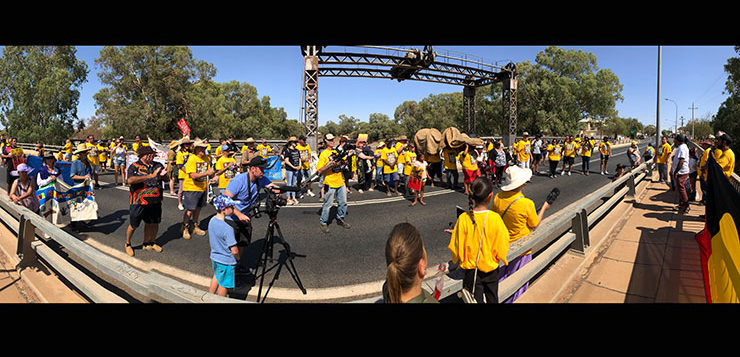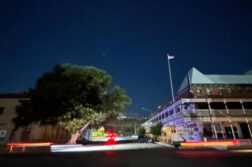Aboriginal leaders from the Far West of NSW are threatening to close down the Barrier Highway – the main road linking Adelaide and South Australia to the eastern states – for a week if the NSW and federal governments continue to ignore growing calls for high-level inquiries into the management of the Murray-Darling Basin.
The highway was closed for half an hour earlier today, at the Wilcannia Bridge over the Barka (Darling River). About 100 people – most of them local residents but some from as far afield as Adelaide and coastal NSW – rallied in protest at the ongoing mismanagement of the Barka. The Murray-Darling is the longest and most important river system in Australia, running from southern Queensland all the way to the ocean in South Australia. Although it covers just 14 per cent of the total Australian land mass, it’s also home to 20 per cent of the country’s agricultural land.
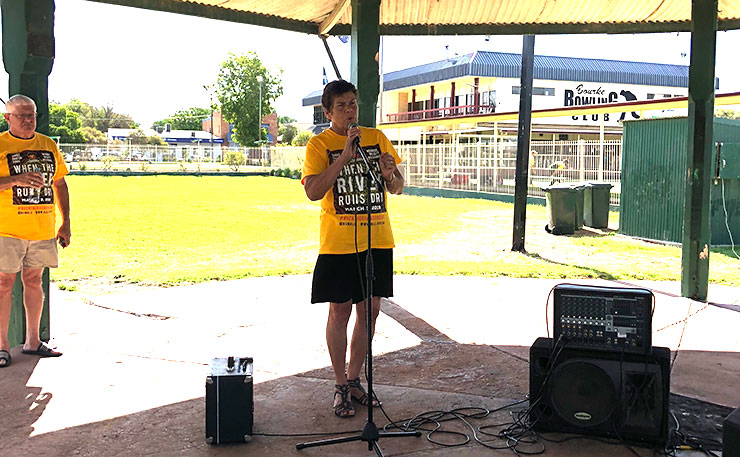
The protest, organised by residents from the Far West and supported by the NSW Aboriginal Land Council and local Aboriginal land councils, coincided with protests held simultaneously in Menindee, Dubbo, Dareton, Bourke and Walgett.
Wilcannia is several hundred kilometres upstream from Menindee, the scene of three major fish kills in recent months which saw more than 2 million fish die, including Murray Cod estimated to be over 50 years old.
Like Menindee, Wilcannia’s water supply is also drying up, with the river passing alongside the town reduced to a series of fetid green pools. Traditionally used as the source of the town’s water supply, the Barka at Wilcannia’s today is undrinkable, courtesy of toxic blooms of blue-green algae combined with lot water flow caused by over-extraction of water upstream by irrigators, and a growing drought in the region.
Uncle Cyril Hunter, a senior Barkindji elder, told the protest rally that unless governments started listening to the concerns of residents, protest action would escalate.
“I hope the government take notice of this rally,” Uncle Cyril said. “If not, I’ll be going against them… when we meet up with the state government. We’re gunna close it next time for a week. A whole week.
“That’s what I’m going to put across to the [government].”
This rally was supported by NSW Police from Wilcannia, and by the local council, with the Barrier Highway closed in both directions, a few hundred metres either side of the Wilcannia bridge.
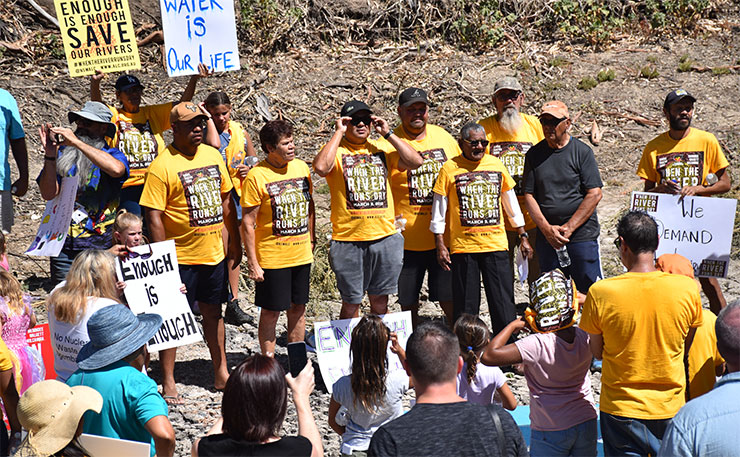
Road trains and grey nomads started to bank up as local residents spoke of their heartbreak at the state of a river that has sustained their region for tens of thousands of years.
Owen Whyman, a Wilcannia resident and an independent candidate in the upcoming state election for the seat of Barwon, attended the rally and told protestors ‘enough was enough’.
“We want to take it to the government, and be a big voice for our Barkindji people, and the people that live along this river, not only for Indigenous people but for non-Indigenous also,” Mr Whyman said.
“Our farmers are struggling because of the all the cotton growers and coal seam gas.
We don’t want their rivers up further being like the state of our rivers.
“It’s a shame, it’s a disgrace, and enough’s enough. We’ve gotta stand up as one, and be one people.”
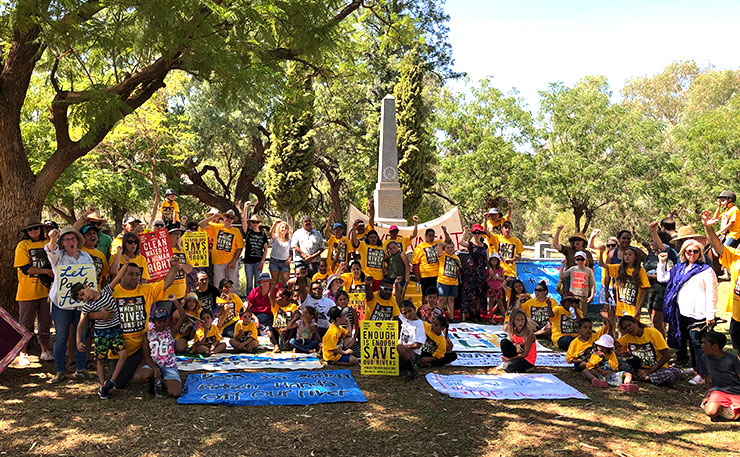
A young local woman invited to speak urged people from Wilcannia and in other communities to take their fight to the nation’s capital.
“It’s sad to see our river dry. We need to get out there and do something about our river. Go to Canberra and have a protest against Canberra, and tell them we need to do something about our river.”
Another woman, from the Coffs Harbour region, timed a trip out west to coincide with the rally. She spoke in support of the Barkindji struggle.
“I want all you people to know that there are so many people on the East Coast who know about you, who know about what’s happening to you and your river and your wildlife and your trees. They know and they’re fighting too… and they care about you and I want you to know that.
“We’re fighting for rivers all over the place, so just take heart and know that a lot of people are behind you.”
The rallies around the state have been supported by the NSW Aboriginal Land Council, which has called for a Commonwealth Royal Commission into the management of the Murray-Darling basin, and a high-level state inquiry.
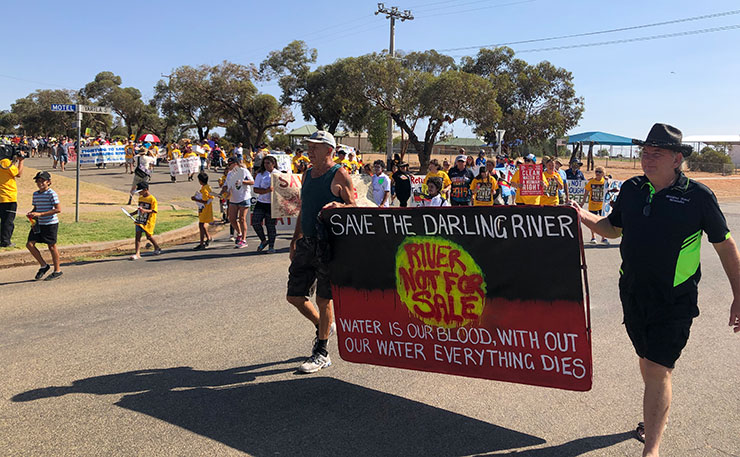
Successive investigations into the management of the Murray-Darling have found that drought is only one factor in the state of the river system.
A report by The Australia Institute blamed over-extraction from the basin by irrigators upstream, and mismanagement by the Murray Darling Basin Authority.
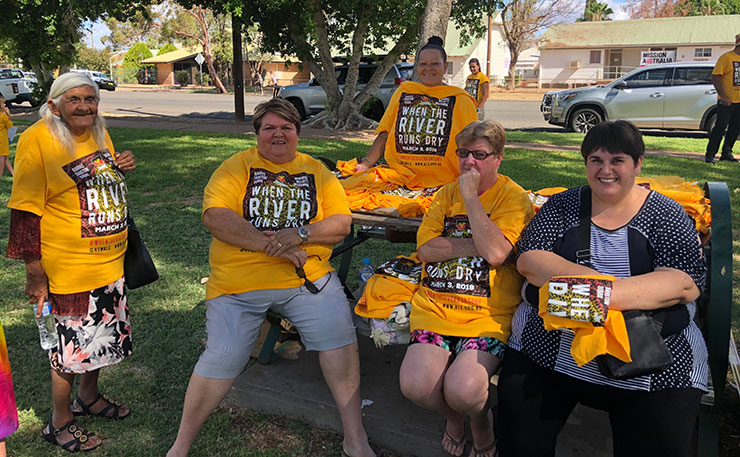
South Australia’s Royal Commission into the basin also found the Authority had mismanaged the river, and had acted illegally by factoring in economic considerations when calculating the amount of water needed to sustain environmental flows in the Murray-Darling.
A third inquiry, commissioner by the federal Labor Party and completed by the Australian Academy of Science, acknowledged drought was a factor in the recent mass fish kills at Menindee, but laid much of the blame on mismanagement of the river system by the MBDA.
* This story is part of the ongoing NM Outback Tour. You can help keep Chris Graham on the road by subscribing to New Matilda here. You can read other features from the series here.
Donate To New Matilda
New Matilda is a small, independent media outlet. We survive through reader contributions, and never losing a lawsuit. If you got something from this article, giving something back helps us to continue speaking truth to power. Every little bit counts.

